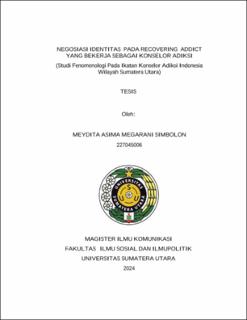| dc.description.abstract | This study aims to analyze the social stigma experiences encounteered by recovering addicts before working as addiction counselors, to examine the identity negotiation process of recovering addicts working as addiction counselors, and to analyze the outcomes of identity negotiation among recovering addicts working as addiction counselors. The theoretical framework employed is identity negotiation as posited by Stella Ting-Toomey to analyze the process and outcomes of identity negotiation in social interactions. This research utilized a qualitative approach with a phenomenological method. Data collection techniques involved in-depth interviews and passive participant observation. The subjects of this study were recovering addicts who had been working as addiction counselors for at least four years and were members of the professional organization IKAI North Sumatra. Information saturation was reached with sample size of five individuals. The findings indicate that recovering addicts experienced stigma prior to working as addiction counselors, being perceived as criminals, societal outcasts, still addicted to narcotics, and burdens to their families, resulting in discrimination, social isolation, and difficulty finding employment. The identity negotiation process for recovering addicts in this study involved increasing knowledge about the counseling and rehabilitation field, fostering awareness of motivations for becoming addiction counselors, and enchancing social interaction skills through effective communication strategies. The outcomes of identity negotiation among recovering addicts working as addiction counselors include feelings of understanding, appreciation, and support from others. | en_US |


